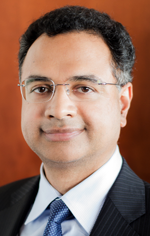Meet Dr. Pratik Mukherjee, Pioneer in the Study of Neurocognitive Disorders
Dr. Pratik Mukherjee is a pioneer in the study of the brain. His award-winning research and patient care are marked by a commitment to continual improvement and new applications of radiology’s tools and techniques.
 As the Director of the Center for Imaging of Neurodegenerative Disease (CIND) and the Neural Connectivity Lab (NCL) at UCSF China Basin, Dr. Mukherjee serves as both a researcher and as a radiologist who treats patients. His field is neurocognitive disorders, conditions which affect thinking and brain function, which are caused by disease, brain injury, or occur during fetal development. Conditions include Alzheimer’s disease; sensory processing disorder, which the San Francisco Chronicle reported on here; and traumatic brain injury (TBI).
As the Director of the Center for Imaging of Neurodegenerative Disease (CIND) and the Neural Connectivity Lab (NCL) at UCSF China Basin, Dr. Mukherjee serves as both a researcher and as a radiologist who treats patients. His field is neurocognitive disorders, conditions which affect thinking and brain function, which are caused by disease, brain injury, or occur during fetal development. Conditions include Alzheimer’s disease; sensory processing disorder, which the San Francisco Chronicle reported on here; and traumatic brain injury (TBI).
Dr. Mukherjee has dedicated a significant portion of his work to studying patients with mild TBI to learn how these injuries affect thinking and function over time. Observing the brain soon after injury, then again in coming months and years, provides an opportunity to understand how the brain accommodates itself to damage. “We’re hoping that will give us insight into the underlying science of how the brain works, which will help us to tailor treatments to people with these conditions,” says Dr. Mukherjee.
Dr. Mukherjee’s TBI studies have taken place at the San Francisco VA Medical Center (SFVAMC), which is staffed by UCSF physicians. SFVAMC is a global leader in treatment and surgery for brain conditions, areas of medicine which frequently rely on radiology. In 2013, the first MRI-guided surgery to implant a deep brain stimulation device was conducted at SFVAMC, which now conducts the most brain stimulation surgeries in the nation.
“With the research we conduct through CIND and the patient care we can give at SFVAMC, we have an amazing opportunity to truly help people and make a difference,” explains Dr. Mukherjee. “Our imaging facilities are used to scan patients for clinical care, but there is also an emphasis on research and discovery.”
The state-of-the-art MRI tools used in research and patient care allow for higher definition images than standard scans permit.
“With instruments such as the 7T MRI, we are able to begin seeing and understanding the brain in ways we’ve never done before. As our imaging techniques become more advanced, we can further improve upon the quality of care that is currently provided to our nation’s veterans.”
Pratik Mukherjee, MD, PhD, is a Professor in Residence in the Department Radiology and Biomedical Imaging, Bioengineering, and he is an attending neuroradiologist at the University of California, San Francisco. He is the Director of the Center for Imaging of Neurodegenerative Disease (CIND) based at the San Francisco VA Medical Center. He also directs the Neural Connectivity Laboratory (NCL) at UCSF China Basin. Dr. Mukherjee received his PhD in Neuroscience from Rockefeller University, New York in 1994 and his MD from Cornell University, New York, in 1995. He completed his internship in Internal Medicine at New York Hospital - Cornell Medical Center, followed by a residency in Radiology and fellowship in Neuroradiology at Washington University Medical Center in St. Louis, Missouri, completed in 2002.
